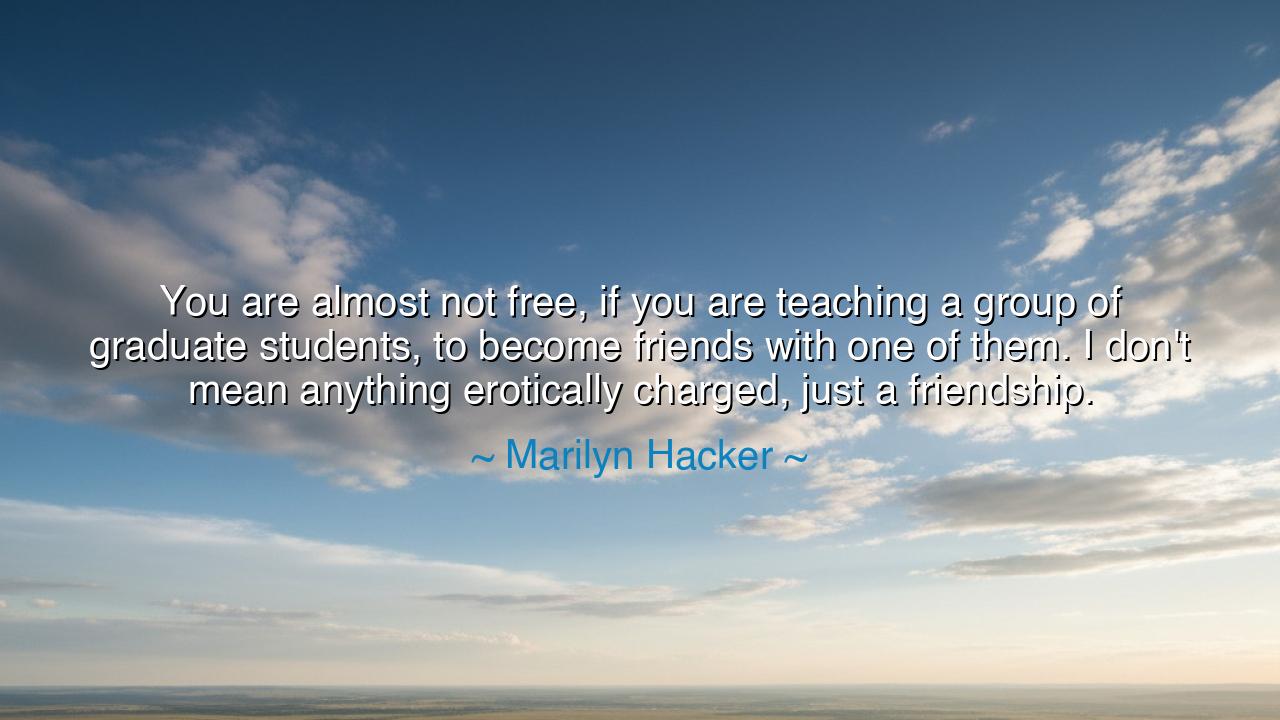
You are almost not free, if you are teaching a group of graduate
You are almost not free, if you are teaching a group of graduate students, to become friends with one of them. I don't mean anything erotically charged, just a friendship.






"You are almost not free, if you are teaching a group of graduate students, to become friends with one of them. I don't mean anything erotically charged, just a friendship." — Marilyn Hacker
In the sacred halls of knowledge, where wisdom is passed from teacher to student, the boundaries between mentor and pupil are often clearly defined. Marilyn Hacker speaks a truth that is not always easy to acknowledge but is deeply rooted in the human condition: that the role of the teacher is one of responsibility, and with that responsibility comes a certain distance. The freedom of the teacher to form friendships with those they instruct is not as simple as it might appear, for in the act of teaching, there is a delicate balance between authority and closeness—a balance that, when disturbed, can disrupt the very foundation upon which education is built.
To teach is to occupy a position of influence, to guide others toward truth and understanding. But this position also carries with it the weight of objectivity, the necessity to remain impartial and clear-headed, free from the distractions of personal emotion or bias. When a teacher allows themselves to form a friendship with a student, that impartiality may be compromised. The teacher’s authority, the very basis upon which knowledge is passed down, can be blurred by the personal connection, creating confusion in the minds of the students, and sometimes even within the teacher themselves. It is not that friendship is inherently wrong, but that its formation within the context of teaching can disrupt the sacred relationship between mentor and pupil, weakening the clarity of the lesson and the respect that the role demands.
Consider the example of Socrates, the great philosopher, who understood the delicate nature of his relationships with his students. Socrates was not merely a teacher in the conventional sense; he was a seeker of truth, a guide who used dialogue to provoke deeper understanding. But even in his relationships with those closest to him—Plato, Xenophon, and others—there was a clear line between their respect for him as a teacher and their affection for him as a man. Plato’s writings reveal the complexity of this relationship: while Socrates was undoubtedly a mentor to his students, their personal feelings were tempered by the knowledge that he was above all a philosopher—his wisdom a force that transcended personal connection. The distance that Socrates maintained allowed him to be both loved and respected, without the dangers of too much familiarity.
This tension between friendship and teaching is also echoed in the story of Aristotle and his famous student, Alexander the Great. As a tutor to the young prince, Aristotle shared with him not only lessons in philosophy and science but also in the art of rulership. However, even as they formed a relationship of mutual respect, Aristotle never crossed the line into deep personal friendship. The bond between them was based on intellectual admiration, not emotional closeness. Aristotle’s teachings remained objective because their relationship, while deep and profound, was never tainted by the complexities that would come with too much personal involvement.
The wisdom contained in Hacker’s words lies in the understanding that teaching is an act of leadership, one that requires a level of detachment in order to preserve the integrity of the relationship between teacher and student. The teacher is meant to guide, not to become too emotionally entangled in the lives of those they teach. Friendship in this context, however pure and genuine, can become a distraction, drawing the teacher away from the clarity needed to instruct and leading the student to confuse respect with affection. The boundaries of authority are delicate, and when they are crossed, both teacher and student may lose sight of the true purpose of their relationship.
Yet, this does not mean that friendship and teaching are entirely incompatible. There are moments when the mentor-student relationship can evolve into true companionship, especially as the student matures and the relationship becomes more egalitarian. As students move beyond the apprenticeship of learning and into the realm of their own wisdom, the teacher’s role shifts from guide to peer. Even Plato, who was once a student of Socrates, ultimately became his equal in thought and spirit. However, while the student still walks in the shadow of their teacher, that shadow must remain clear and undistorted by personal connection.
The lesson for us, then, is that there is a time and place for friendship, but in the context of teaching, it must be approached with caution. A teacher must never forget their role as a leader of minds, and in doing so, must maintain the distance that preserves the integrity of the knowledge they impart. Friendship is a beautiful and necessary part of life, but it is not the purpose of teaching—it is the result of mutual respect and understanding, forged over time, and only when both parties have walked the path of learning together. Let us remember that the greatest gift a teacher can give is not the intimacy of personal connection, but the clarity and wisdom of their guidance.






AAdministratorAdministrator
Welcome, honored guests. Please leave a comment, we will respond soon